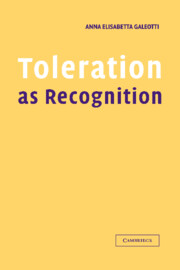Book contents
4 - The Islamic veil in French schools
Published online by Cambridge University Press: 22 September 2009
Summary
INTRODUCTION
In the next three chapters I will look at some exemplary cases concerning toleration, employing the theoretical framework outlined above. I have picked out three examples which I take to represent different steps in the comprehensive argument for toleration as recognition.
The argument for toleration as recognition has arisen from the distinction between trivial and genuine questions, the former concerning cases that find an easy solution in the liberal tradition, while the latter do not. What I intend to discuss first in this chapter is a classic example of a genuine question of toleration, namely, l'affaire du foulard – i.e. the contested acceptance of the Islamic headscarf in French state schools. This involves a genuine case of toleration insofar as, first, it engendered a long-standing public controversy within and outside France; second, it necessitated the intervention of the state; and, third, normal liberal views of toleration were unable to provide a satisfactory settlement: under standard interpretations, this case appeared either inexplicable or insoluble. I am going to reconstruct the various arguments in favor of and against toleration in this case drawn from liberal theory, and show their shortcomings. I shall argue that the problem lies in the interpretive framework rather than in the normative structure of liberal toleration. I shall then outline a different understanding of this kind of conflict – what is at stake and what the claims amount to – which will point to toleration as recognition for the solution of this controversy.
- Type
- Chapter
- Information
- Toleration as Recognition , pp. 115 - 136Publisher: Cambridge University PressPrint publication year: 2002



